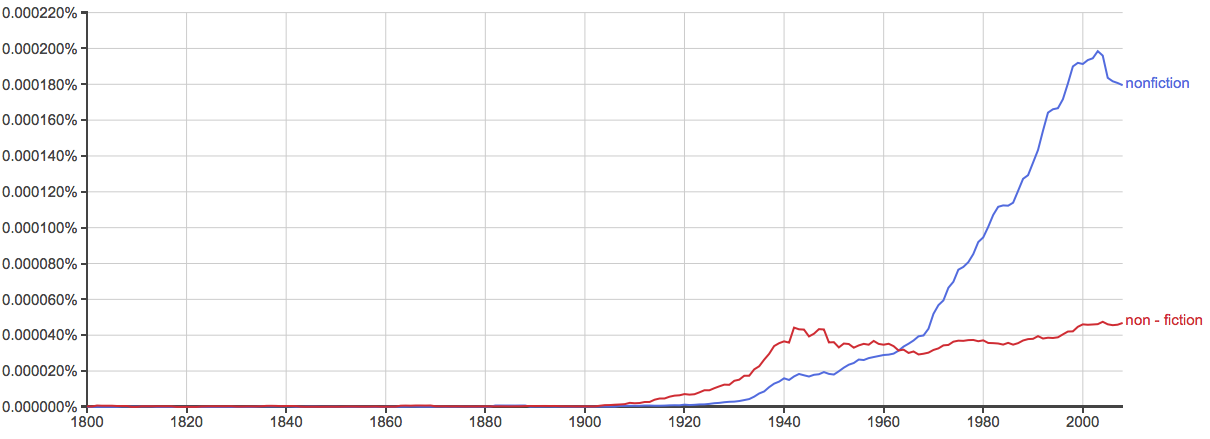We see these words in libraries and bookstores, in magazines and online, but what do fiction and nonfiction really mean? What kinds of writing belong in each of these categories, and why?
You are not the first writer to ask these questions, and you will not be the last. Works of fiction and nonfiction can each be enthralling and valuable pieces of literature, but they are different in several important ways.
Continue reading to learn the differences between fiction and nonfiction, and how you can use these words in your own writing.
What is the Difference Between Fiction and Nonfiction?
In this post, I will compare fiction vs. nonfiction. I will use each of these words in at least one example sentence, so you can see them in context.
I will also show you a unique memory tool that will help you decide whether a piece of literature is fiction or nonfiction.
When to Use Fiction
 What does fiction mean? Fiction refers to made-up stories. These stories are not based on real-life events or characters. Fictional stories can be mysteries, fantasy tales, historical dramas, romances, etc.
What does fiction mean? Fiction refers to made-up stories. These stories are not based on real-life events or characters. Fictional stories can be mysteries, fantasy tales, historical dramas, romances, etc.
In popular language, fiction is also used to describe anything that is not true.
Here are a few examples of the word fiction in a sentence,
- “I am penning a new work of fiction!” said the old-timey writer from a coffee shop in Paris.
- “The President’s allegations are pure fiction!” screamed the reporters.
- Many people did not know that The War of the Worlds was a work of fiction the first time they heard it.
- Some of the new technologies seem straight out of science fiction. –The Wall Street Journal
Novels are a classic example of fictional prose. If you enjoy reading novels, you are a fan of reading fiction.
When to Use Nonfiction
 What does nonfiction mean? Nonfiction works are based on real people or events. Memoirs, biographies, documentaries, and works of history are all examples of nonfiction.
What does nonfiction mean? Nonfiction works are based on real people or events. Memoirs, biographies, documentaries, and works of history are all examples of nonfiction.
Here are a few more examples,
- “You will find the biography of Rutherford B. Hayes in the nonfiction section,” said the librarian.
- I would write a memoir, but the details of my life are so fantastical that people would not believe it is a work of nonfiction.
- The new self-help book climbed its way to the top of the nonfiction best sellers list.
- A biography of a book, rather than a person, is a relatively new wrinkle in nonfiction. –The Washington Post
If you enjoy reading biographies, memoirs, historical works, or books on current events, you are a fan of nonfiction works.
Nonfiction sometimes appears as a hyphenated word: non-fiction. Either spelling is accepted, but, as you can see from the below graph, you can see that nonfiction is much more common.

Trick to Remember the Difference
 Now, let’s go over a trick to remember nonfiction vs. fiction.
Now, let’s go over a trick to remember nonfiction vs. fiction.
A work that is nonfiction is a recounting of real events. A work of fiction is based on made-up people or events.
Since fiction and false begin with the same letter, we can easily remember that fiction is false, even if it is an excellent and well-crafted story.
You can extend this mnemonic to nonfiction as well. A nonfiction story is not fake.
Summary
Is it fiction or nonfiction? Fiction and nonfiction are two categories of writing.
- Fiction deals with made-up people or events.
- Nonfiction deals with real life.
Fiction is also a word that is commonly used to describe anything that is not true, like wild accusations or patently false testimony. This article, though, is a work of nonfiction.
Since fiction and false each begin with the letter F, remembering that a work of fiction is not a true story should not be difficult to remember.
It might be difficult to remember the difference between these words, but remember, you can always reread this article for a quick refresher.
Contents
